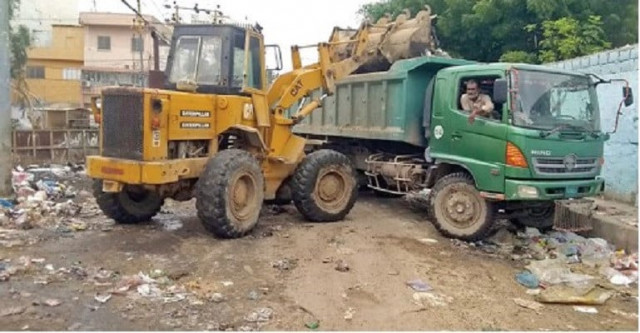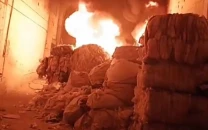Karachi's Central district responds to health crisis
Medical camps set up in rain-affected areas equipped with medication for resulting illnesses

The torrential rains of the past week have been a bane for the megacity’s infrastructure, much of which was never built to stand urban floods of such intensity. However, the submerged streets and pools of standing water mixed with animal remains from Eid, have also heightened the risk of various disease outbreaks in Karachi, which is already struggling to save its hide from a Covid-19 resurgence.
Currently, a nauseating stench of blood and rotting flesh looms over most parts of Karachi, especially close to landfills and dumping sites where leftovers from Eidul Azha have been callously stashed.
When it rains, fumes from these sites cloud the city, making it unbearable to breathe, as well as opening doors to various maladies.
In regard to this, a medical camp has been set up in the New Karachi area, at the behest of the provincial health minister and health secretary, as part of a crisis response effort to save rain-affected areas of the Centeral district from diseases.
Similar camps are also being set up in other parts of the city, following the meteorological department’s warning of further, more damaging rain spells this week.
Read Karachi reels from rain fury amid fresh forecast
Other than medical camps being established in response to the rain, the Central District has eight health centres in total, one of which is a mother and child health clinic.
For a population of over 3,165,562 people, the Central District has 97 doctors, 200 paramedical staff, and 350 health workers on duty.
According to Centeral District Health Officer Dr Muzaffar Ortho, these medical camps are equipped with medication for diarrhoea and other stomach related infections, which are likely to see an upsurge this season.
Per the doctor, typhoid is another disease that may spread after monsoon spells in polluted areas. Other than that, people with allergies, he warns, might also find it difficult to be out in the open air, where there are various allergens. “If past monsoons are any indication, the people of Karachi are likely to get sick over the coming weeks, if caution is not observed,” said the doctor.
“It is advised that people try to stay home as much as they can, and keep their surroundings clean, which includes not bringing outside footwear inside the house. People with allergies should take their precautionary medication and everyone should avoid eating street food, which is more than likely to be contaminated,” he added.



















COMMENTS
Comments are moderated and generally will be posted if they are on-topic and not abusive.
For more information, please see our Comments FAQ